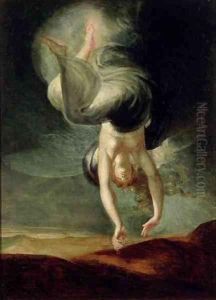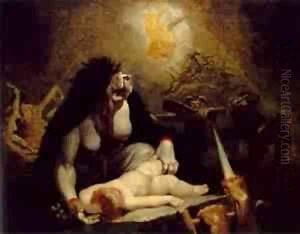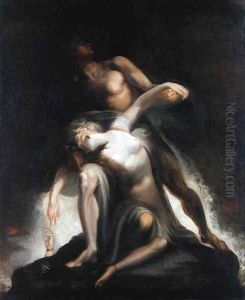Johann Heinrich Fussli Paintings
Johann Heinrich Füssli, also known as Henry Fuseli in English-speaking countries, was a Swiss painter, draughtsman, and writer on art, born on February 7, 1741, in Zürich, Switzerland. Füssli is best known for his dramatic and imaginative paintings with subjects drawn from mythology, literature, and the supernatural, often focusing on themes of horror and eroticism. His most famous work, 'The Nightmare' (1781), embodies the Gothic Romantic spirit that defines much of his art, depicting a demonic incubus crouching on a sleeping woman, a powerful image that has become iconic in visual art.
Füssli's early life was shaped by his intention to enter the ministry, following in the footsteps of his father, Johann Caspar Füssli, a painter and writer. However, his interests shifted towards art and literature, leading him to abandon his theological studies. In 1761, he moved to Berlin, and then to London in 1763, where he initially worked as a translator. His encounter with Sir Joshua Reynolds, a leading English painter of the time, encouraged Füssli to pursue a career in painting. He spent a significant period in Italy (1770-1778) to study the works of classical and Renaissance masters, which greatly influenced his style and thematic preferences.
Upon his return to England, Füssli began to establish himself as a distinctive artist, blending elements of classicism with the emergent Romantic sensibility. He became a member of the Royal Academy of Arts in 1790 and later served as its professor of painting and keeper. Throughout his career, Füssli produced a vast number of sketches, paintings, and illustrations, including a series for an edition of Shakespeare's works and Milton's 'Paradise Lost'. His art is characterized by dynamic compositions, dramatic contrasts of light and shadow, and a keen interest in portraying psychological intensity.
Füssli's influence extended beyond his immediate circle to affect the Romantic movement in England and across Europe. His fascination with the supernatural, the sublime, and the erotic challenged conventional norms and opened new avenues for the exploration of human emotion and the imagination in art. Despite the controversy some of his works generated, his contribution to the Romantic movement and to the development of modern art is undeniable.
Johann Heinrich Füssli passed away on April 16, 1825, in Putney Hill, London, leaving behind a legacy that continues to intrigue and inspire artists and audiences alike. His works are preserved in many major museums around the world, attesting to his enduring appeal and the significant impact he had on the art of his time and beyond.


